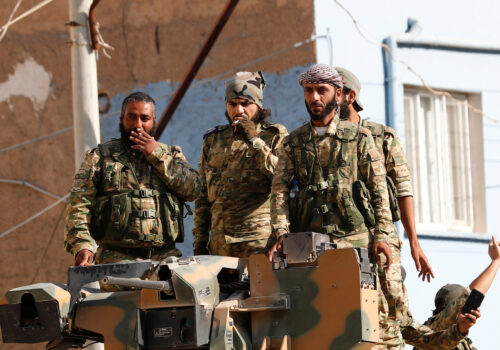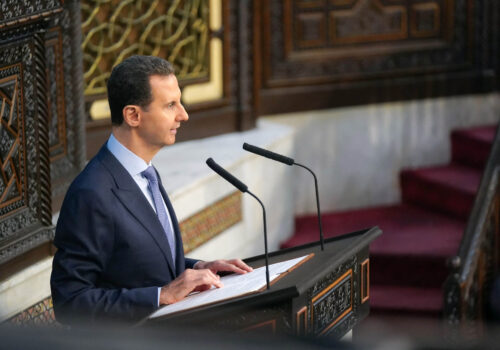Member states can and should refer the situation of Syria to the ICC
On May 20, the prosecutor of the International Criminal Court (ICC) made waves in boldly requesting the issuance of arrest warrants for Israel’s prime minister and defense minister as well as three Hamas leaders accused of war crimes and crimes against humanity in Israel and Gaza. The decisive action confirms the ICC’s crucial role in addressing international crimes wherever they occur and the importance of the equal application of the law. It must also be applied to a conflict that has plagued the world’s conscience for too long: Syria.
The Syrian conflict has claimed the lives of over 230,000 civilians, with over 100,000 missing and millions more displaced, earning the unenviable label of “the biggest humanitarian and refugee crisis of our time.” The Syrian government’s conduct, resulting in these shocking numbers, has targeted civilians through the use of 82,000 barrel bombs, 336 chemical weapons attacks, and nearly 500 cluster munitions bombardments. These attacks on civilian and protected infrastructure include hospitals, the use of starvation, arbitrary detention, and torture, often involving sexual violence.
Multiple United Nations (UN) reports have confirmed that members of the Syrian government and the Syrian military are the main perpetrators of serious human rights violations and crimes under international law and that these officials must be investigated and prosecuted for crimes against humanity and war crimes. That said, allegations of serious crimes in Syria are not limited to the government—accountability is needed for all violations, regardless of the perpetrator group.
SIGN UP FOR THIS WEEK IN THE MIDEAST NEWSLETTER
There have been efforts to hold the Syrian state accountable—namely, the International Court of Justice (ICJ) case brought by the Netherlands and Canada focused on violations of the Convention Against Torture as well as criminal prosecution of individuals, notably in Koblenz, Germany and Paris, France. But to date, many of the most responsible have evaded justice. Indeed, they are traveling freely and being re-accepted into many diplomatic circles.
It is for these many reasons that there is a compelling case for the ICC to take action—a court set up to prosecute those most responsible for the commission of certain international crimes, including war crimes, crimes against humanity, and genocide. The Rome Statute, the treaty establishing the ICC, contains three avenues through which the court can exercise jurisdiction. For crimes committed on the territory of or by nationals of states that have accepted the ICC’s jurisdiction, any ICC member state can refer the situation to the court, or the prosecutor can initiate his investigation. The third avenue is through the UN Security Council (UNSC), which can refer any situation to the ICC, regardless of a state’s membership in or acceptance of the court. Despite a widely-supported attempt in 2014 by thirteen states on the UNSC to refer the situation of Syria to the ICC, Russia and China used their veto to prevent a UNSC referral. Furthermore, because Syria has not ratified the Rome Statute or otherwise accepted the court’s jurisdiction, the prosecutor could not initiate an investigation on his initiative, and member states could not refer to crimes happening exclusively on the territory of Syria.
Until a few years ago, Syria’s pathway to the ICC was closed due to the veto and its not being a member state. But in 2018 and 2019, two historic ICC decisions re-opened the door for Syria’s situation. Five years on, that door must be pushed wide open.
What is the pathway for Syria to the ICC?
In 2018, the ICC Pre-Trial Chamber made a landmark decision determining the court had jurisdiction over the deportation of the Rohingya from Myanmar into Bangladesh, even though Myanmar is not an ICC member state and the UNSC did not refer the situation in Myanmar to the ICC. The key factor was the Myanmar military’s deportation of hundreds of thousands of Rohingya into Bangladesh, which is an ICC member state. When the Myanmar military’s brutal campaign of violence against civilians forced the Rohingya to flee their homes and cross the border into Bangladesh, a transboundary or cross-border crime took place: deportation. This crime against humanity under the Rome Statute opened a pathway to jurisdiction because an element of the crime was completed on the territory of an ICC member state, in that under the ICC’s Elements of Crimes, deportation requires a perpetrator to coerce or expel persons into “another state” as part of a widespread or systematic attack against the civilian population.
On this basis, in 2019, the prosecutor requested authorization to investigate three crimes against humanity in Myanmar with a cross-border element: deportation, persecution, and other inhumane acts. Persecution was alleged because Myanmar officials’ violent deportation was done on discriminatory ethnic and religious grounds. Myanmar officials allegedly committed the other inhumane act of depriving the deported Rohingya of the right to return to Myanmar through various policies, actions, and omissions, effectively expelling the Rohingya and locking the door behind them. Later, in 2019, the Pre-Trial Chamber granted the prosecutor’s request, thereby authorizing a full investigation into the Myanmar/Bangladesh situation.
The rulings are crucial for Syria, where similar horrors have driven hundreds of thousands into Jordan, which is also an ICC member state. The similarities between the Syria/Jordan situation and Myanmar/Bangladesh are striking. Both involve brutal, systematic attacks on civilians, leading to massive displacements. Myanmar’s brutal military operations pushed about 750,000 Rohingya into Bangladesh through indiscriminate attacks on villages, murder, arson, sexual and gender-based violence, arbitrary arrests, and torture. These violent, coercive acts gave Rohingya victims no other choice but to flee their homes. Similarly, the Syrian regime’s horrific tactics—indiscriminate bombing, chemical attacks, arbitrary arrests, sexual and gender-based violence, and torture—augmented by clear statements made by President Bashar al-Assad—have driven over 630,000 Syrians into Jordan, where they remain. Jordan has ratified the Rome Statute and, like Bangladesh, opens jurisdiction for the ICC to investigate the crimes of deportation, as well as persecution and other inhumane acts, that originated in Syria and ended in Jordan.
State party referral and ICC – IIIM collaboration
More than fifty Syrian victims deported to Jordan have taken legal action. In the last five years, the ICC prosecutor has received at least four communications from victims, their counsel, and nongovernmental organizations (NGOs) arguing that the ICC has jurisdiction to open an investigation, including from Legal Action Worldwide (LAW). However, to date, no decision has been made on these communications. Under Article 15 of the Rome Statute, the prosecutor has discretion whether to open an investigation based on these communications. There is no required timeframe in which he must respond or act.
However, ICC member states have the power to compel the court to act under Article 14 of the Rome Statute. Any ICC member state can refer the situation of Syria/Jordan to the ICC prosecutor, thereby requesting the opening of an investigation. There are four key factors that make a state party’s referral of the Syria/Jordan situation the most compelling and efficient route to accountability for serious international crimes there. First, a state party referral is a relatively easy process. Article 14 does not impose an evidentiary burden on the referring state. Recent state party referrals of complex situations in Ukraine, Palestine, and Venezuela have totaled a mere two to five pages. Second, a state party referral puts a positive obligation on the prosecutor to open an investigation unless he determines there is no reasonable basis to proceed. This obligation starkly contrasts the degree of discretion the prosecutor enjoys in determining whether to open an investigation upon receiving Article 15 communications from NGOs, including those already received on this matter. Third, as laid out in the Rome Statute and confirmed by recent jurisprudence from the Afghanistan situation, an Article 15 communication requires that the prosecutor seek Pre-Trial Chamber authorization to open an investigation—a process that can take months or longer. A state party referral adds the procedural bonus that the prosecutor does not have to seek such authorization. Fourth, the Office of the Prosecutor (OTP) could rely on large volumes of relevant evidence that the United Nations has already collected and analyzed.
The UN General Assembly specifically created the International, Impartial and Independent Mechanism (IIIM) to assist in the investigation and prosecution of persons responsible for the most serious crimes under international law committed in the Syrian Arab Republic since March 2011. The IIIM would likely support an investigation based on the Myanmar/Bangladesh precedent, including the transfer of the vast amount of evidence it has already compiled demonstrating the context in which the crimes against humanity have been committed in Syria. The combination of a state party referral and the ICC – IIIM collaboration would not only ensure an efficient use of limited resources but would send a clear and unequivocal message to perpetrators and victims alike.
More than a decade has passed since the start of the Syrian conflict, but domestic avenues offer an insufficient degree of accountability and inadequate remedies to the vast numbers of victims and their families. A new Syria cannot be built without acknowledging the past and addressing the horrific crimes that have taken place. This is not mere sentiment but a factual statement backed by decades of evidence and experience. Accountability at the highest levels is a necessary step towards meaningful reconciliation in Syria and creating a pathway for the future. Now is the time for member states to show leadership and protect the norms of international law by ensuring that the situation in Syria is referred to the ICC. Unlike the ICJ, the ICC offers Syrian survivors of mass atrocity the rare opportunity for individual criminal responsibility at the highest levels of government, and it is now up to states to make this happen.
For more information, see LAW’s policy brief: An Untapped Justice Opportunity for Syria: A State Party Referral to the International Criminal Court.
Yaser Tabbara is the co-founding board member of the Syrian Forum and their chief strategist.
Nick Leddy is head of litigation at Legal Action Worldwide (LAW) and a former ICC OTP Trial Lawyer.
Further reading
Fri, Aug 16, 2024
Syrian elections ended. What have we learned from the results?
MENASource By Vladimir Pran and Maroun Sfeir
The new parliament might be rejuvenated with significant turnover, but will likely remain in the service of the top Baath leadership.
Tue, Jun 18, 2024
From rebel factions to an army: Efforts to tame the Syrian National Army
MENASource By Levent Kemal
The ultimate goal of reforming the SNA is to create space for a self-sufficient political actor that organizes public policies.
Wed, Sep 4, 2024
In France, it is no longer taboo to prosecute sitting heads of state like Bashar al-Assad
MENASource By Jeanne Sulzer and Clémence Witt
The June 26 decision is the first court decision to suggest that there is no such thing as absolute immunity for a sitting head of state.
Image: Syrian refugees walk at the Zaatari refugee camp in the Jordanian city of Mafraq, near the border with Syria, Jordan June 17, 2021. Picture taken June 17, 2021. REUTERS/Alaa Al Sukhni




